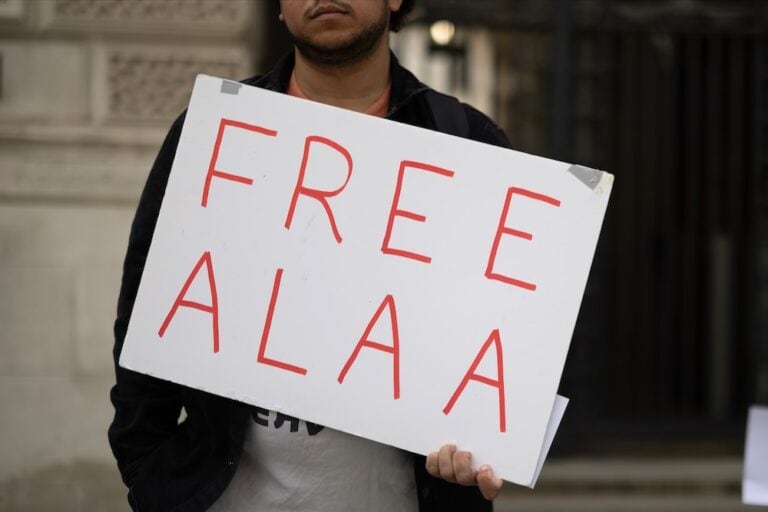(RSF/IFEX) – Not content with attacking its opponents in Tunisia, President Ben Ali’s regime decided to launch a legal action in England against the London-based Arabic television station Al Mustaquilla. The station’s director, Mohammed el Hachmi Hamdi, was informed by a British law firm that Tunisian judge Jedidi Ghnia had filed a suit against him. […]
(RSF/IFEX) – Not content with attacking its opponents in Tunisia, President Ben Ali’s regime decided to launch a legal action in England against the London-based Arabic television station Al Mustaquilla. The station’s director, Mohammed el Hachmi Hamdi, was informed by a British law firm that Tunisian judge Jedidi Ghnia had filed a suit against him. Ghnia believes he was slandered during a recent programme broadcast on the station. His lawyers feel the station’s programmes violated Independent Television Commission (ITC, a British organization in charge of issuing licenses and regulating private broadcasting) regulations. “Once again, the Tunisian state is using drastic measures to silence opposition voices. Everyone knows that behind this judge, the regime is acting. Some of the ‘slanderous’ comments cited have nothing to do with Jedidi Ghnia but are about massive human rights violations in Tunisia,” said RSF Secretary-General Robert Ménard. “It seems clear that the Tunisian authorities want to financially strangle the station, which they know has limited resources. Long legal proceedings will certainly end up bankrupting the station. RSF is certain that the ITC will act impartially if these threats are indeed carried out. Al Mustaquilla did nothing more than exercise its right to freely inform,” he added.
On 23 August 2001, el Hachmi Hamdi was informed by the British law firm Farrer & Co. that his station had broken ITC regulations during several of its programmes. The law firm had been retained by Tunisian judge Ghnia, who felt he had been slandered during the 17 June broadcast of the Le Grand Maghreb programme. The station is accused of “inciting and supporting actions against the Tunisian government, its judiciary and the rule of law.” Another accusation against the station is that it never invites Tunisian government representatives to appear in debates. On this point, the station’s director told RSF on several occasions that Tunisian officials were invited before the airing of each programme, but always refused to appear.
Moreover, according to several testimonies, any person who tries to phone Al Mustaquilla in London (on the director’s mobile phone, at his home, on the switchboard number and at the station’s studio) from Tunisia is unable to get through. Furthermore, several persons who were scheduled to appear on the Le Grand Maghreb programme in recent weeks, such as lawyer El Ayachi el Hamami and Souad Gharbi, a member of the Mouvement des démocrates sociaux, were prevented from leaving Tunisia.
El Hachmi Hamdi has received telephone threats from Tunisia in recent months (see IFEX alert of 27 June 2001). The programme Le Grand Maghreb regularly features Tunisian opponents such as Khemaïs Chamari, Khemaïs Ksilla, Mohammed Charfi, Mokhtar Trifi, Moncef Marzouki, and others. “You are the cause of the problems,” and “we are at war with you,” he has been told. After the appearance of Sihem Bensedrine, publisher of the online publication “Kalima” (www.kalimatunisie.com) and human rights activist on Le Grand Maghreb, on 17 June, the threats were renewed. The callers asked el Hachmi Hamdi to broadcast an apology on his station. They threatened to bomb the station’s offices if he rejected their demands. They also said that they were ready to spend a great deal of money in proceedings against the station in British courts. For several weeks, the director was publicly attacked in some Tunisian media outlets, such as the private weekly “Ech Chourouk”. In addition, several of his family members were summoned to the police station in Sidi Bou Zid (central Tunisia) and two of their vehicles were confiscated by police without explanation.
As for Bensedrine, she was arrested upon her return from Europe on 26 June, after appearing on the Le Grand Maghreb programme (see IFEX alerts of 6 July and 27 June 2001). She was jailed for seven weeks before being provisionally released.


